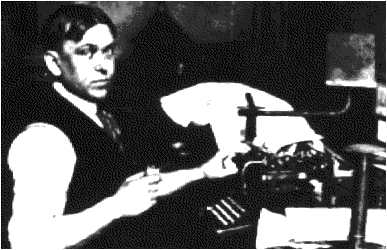American Literature
(Ohio University)

Are they to be got by putting want-ads in the New York Times? No such experts, I fear, really exist in the world. Even in the narrow field of psychiatry those who pretend to existence are mainly quacks, and judges and juries who believe even policemen commonly laugh at them.
I have frequently advocated cleaner and more rational devices, that would dissuade them from crime or make them incapable of it, and yet leave free play for their courage and enterprise in useful fields, e. g., flogging for petty robbers and thieves, the amputation of the right forefinger for pickpockets, the pillory for such offenders as the Hon. Mr. Fall [Albert Fall, indicted in the Teapot Dome scandal], the ducking-stool for Methodist bishops, deportation to the Dry Tortugas for Prohibition agents.
In a review of a book by Joseph Wood Krutch, Mencken takes issue with the phrase "the meanness of human life," and in the process brings in historical comparisons that are winningly overstated:
This is more bologna. Human life is quite as spacious and charming today as ever it was. Shakespeare himself, compared to Wagner, lived like a pig. Aristotle, compared to Einstein, was an ignoramus. Is it a sign of decay that the Greek tragedies no longer make us tremble? Plainly not. It is a sign that we are better men than the Greeks were. They never invented anything half so ingenious as the printing press or the photographic camera. They never discovered anything as important as the cell. They never produced a political document to compare to the Bill of Rights. Their governments were transitory and corrupt, their wars were bloody and idiotic, their pleasures were barbaric, and their comforts were those of prisoners in a chain-gang.
It is the parallelisms, the careful building of reverse --- and perverse --- logic, the dazzling vocabulary that make his best reviews worth reading again and again. There is, too, his superb sense of balance and form, for he structures the essays to grab our attention from the very beginning. We include in our "Readings" section a review of the book Meet General Grant from The American Mercury. Pay especial attention to the assiduous demolition of Grant: "His imagination was the imagination of a respectable hay and feed dealer..." "He had a vague distaste for war, and dreamed somewhat boozily of a day when it would be no more."
Note, too, his creative vocabulary, his appeal to illogical logic --- and the sly demolition of others by what seems to be compliments: the author "is a man of Southern birth and grew up in the midst of the Confederate katzenjammer, but there is no sign of it in his narrative. He is magnificently impartial. The fustian of the Federal patrioteers does not deceive him..."
In a recent issue of the Los Angeles Times Book Review, a Brad Leithauser quoted one of Mencken's biographers: "it is often difficult to read him without tears of laughter streaming down one's face..." Leithauser's response:
this is a difficulty that I, making my way through various stretches of Mencken over the years, have always managed to surmount.
Perhaps he was offended by Mencken's characterization of Los Angeles as a "town that has more morons in it than the whole State of Mississippi." In any event, when we come across maulings like this, we --- like Mencken --- can rest assured that the native-grown American Homo boobiens are alive and well, even in twenty-first century America.